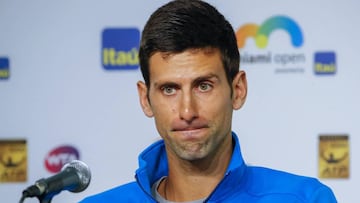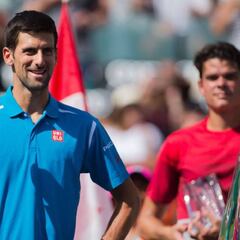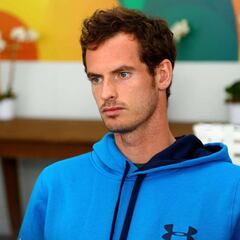Djokovic issues apology over prize money remarks
The world number one caused a stir when he suggested men should receive more prize money than women on the international tennis circuit.

Novak Djokovic made peace with Billie Jean King, Chris Evert, Serena Williams and others Wednesday, supporting equal prize money for men and women tennis players after days of controversy.
The world number one from Serbia suggested men attract more spectators and deserved better paydays in remarks Sunday after winning the Indian Wells final.
"Stats are showing that we have much more spectators on the men's tennis matches. I think that's one of the reasons why maybe we should get awarded more," said Djokovic, who also noted women "have to go through a lot of different things that we don't have to go through, you know, the hormones and different stuff."
Djokovic issued an apology of sorts on social media Tuesday but refused to back down from his remarks, leaving that for his news conference at the ATP and WTA Miami Open, where he is the top seed and defending champion.
"I never had an issue with equality in gender or sport or other areas of life," Djokovic said. "We all deserve more of the wealth distribution from the tournaments."
The 11-time Grand Slam singles champion added, "I feel very sorry if I hurt my female colleague tennis players. I have a huge respect for all of them."
Djokovic said he had sent messages to Andy Murray, Serena Williams and others who had been critical of his earlier remarks.
"I never had any intention to offend them or come up with any negative connotations in my statement," Djokovic said. "I don't make any differences between the genders. I am for equality in the sport."
Djokovic spent 30 minutes talking to reporters before speaking with Billie Jean King and Chris Evert about his comments, saying King was not in a fiery mood after her years fighting for gender equity in prize money.
"She was in a very good mood with me," said Djokovic. "We spoke about opportunities that a tennis player has, to use his influence to make a positive difference in the world. We had a nice and friendly chat."
King and Evert spoke to reporters earlier, generally talking beyond tennis issues about gender equity but saving a few choice words for Djokovic.
"I didn't quite understand the hormones thing," Evert said. "You don't talk about women's hormones. Anywhere."
"He was talking about our monthly situation," King said. "Like it was the dark ages."
Evert cited cultural differences between Djokovic growing up in Europe and Americans embracing equality for women as a principle in a different time frame.
"I think a lot of the comments are cultural," Evert said. "I don't hear that too much from the American men's tennis players. "I just think America was the first country. The Europeans took the cue from America. Americans respected equality in a lot of life levels earlier than Europe did."
King noted Djokovic has had a young son recently and said that and culture could play a role in his remarks. "My prayer is that most of the guys have daughters," King said. "I think it changes them."
Related stories
Djokovic, who again will try to complete a career Grand Slam at the French Open, said he was shocked at the magnitude of outrage his comments caused.
"I was a little bit surprised with what kind of proportions and directions this story got in the media the past few days," Djokovic said. "There were no bad intentions. People probably understood it the wrong way. The outreach of this story was tremendous."

